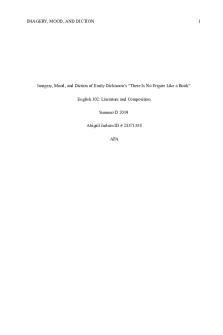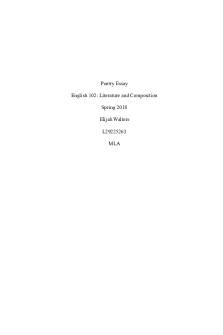Synthesis Essay of Confessional Poetry PDF

| Title | Synthesis Essay of Confessional Poetry |
|---|---|
| Course | American Women Poets |
| Institution | Northern Kentucky University |
| Pages | 2 |
| File Size | 48 KB |
| File Type | |
| Total Downloads | 8 |
| Total Views | 126 |
Summary
This synthesis essay was written as a final exam over confessional poetry including poets Sylvia Plath, Anne Sexton, etc....
Description
Shelby Conrad Dr. Donelle Dreese ENG 300 May 1st, 2018 In discussing several American women poets, an interest arose when discovering that many of these influential women’s works, held a common theme. There were three women in particular, that resonated with me through their confessional poetry. By defining issues such as depression and suicide, these three poets built a strong relationship amongst one another, using personal experience and feelings, wit, and occasionally sarcasm. Janice Mirikitani’s “Suicide Note”, Anne Sexton’s “Wanting to Die”, and Sylvia Plath’s book of poetry Ariel, all embrace this desolate side of life, and as women, they create a strong bond amongst one another, and their readers, through their individual works. Janice Mirikitani’s “Suicide Note” is anything but vague in expressing the strength that suicide has in our society, and the pressures that many individuals face from their loved ones. As I have discovered through confessional poetry, poets such as Janice Mirikitani are unafraid of stating the uneasy truth about these grim moments in life. In “Suicide Note” Mirikitani repeats the lines “not good enough”, “not strong enough”, “not smart enough”, “not pretty enough,” and I find myself in tears over the desolate aloneness that is expressed in these few words. One thing that seems to differentiate Mirikitani from other confessional poets within this poem, relies heavily on the apology, she states, “dear mother and father. I apologize for disappointing you. I've worked very hard.” Here, the reader is welcomed into the moment in which the speaker has accepted her defeat through an apology, as she confesses, what she perceives to be, unsatisfactory grades. “I apologize” is repeated a couple times throughout the poem as Mirikitani expresses each “failure” as an unacceptable weight, crippled by simply being a woman. What I find to be most compelling is the way in which Mirikitani’s culture arises in stating, “If only I were a son… in my father’s dream,” and how that stigma or stereotype has placed this self-doubt and ultimate suicide, within the life of the speaker. As a woman, and an Asian American, Mirikitani is able to build a close understanding of the young woman, and because of this, creates a beautiful confession of guilt. Within “Suicide Note” we see an admission of guilt, but without reason, as this young woman, the speaker, feels at fault for simply being a woman and additionally Asian. In this case, we see confessional poetry spoken through personal experience and feelings, as Mirikitani is able to express her culture through this burdened existence. Comparatively, Anne Sexton portrays these same marketed feelings of depression in her poem “Wanting to Die”, yet does so with a wittiness that seems to poke fun at her inability to want to live. If you were to read up on Sexton, you would know that she battled post-partum depression and eventually succeeded at taking her own life. She confesses deeply her feelings and her experiences stating, “Twice I have simply declared myself, have possessed the enemy, eaten the enemy, have taken on his craft, his magic.” Sexton expresses her “lust” for life that inevitably leaves her dangling on the edge between being alive and simply leaving this earth. She expresses the fine line between life and death and confronts her instincts saying, “I have rested, drooling at the mouth-hole,” “suicides have already betrayed the body.” In these lines we see confessional poetry come to life, as the poet, in this case Sexton, openly expresses their
most vulnerable state to the reader. Just as confessions often entail things that would only be discussed in close quarters, confessional poetry take those details of one’s life and allows the reader to experience them through the words of the poet. Anne Sexton’s confessional poetry reacts very openly to often close-minded poetry that preceded her work, especially as a woman during her lifetime. As previously mentioned, it is believed that she suffered from post-partum depression, although it may not have been deemed as such to her peers during her time of writing. Her poems, such as “Wanting to Die” are the textbook definition of confessional poetry, in my opinion as she engages her readers through subject matter that is often repressed or unseen so openly. Sylvia Plath has also aided in defining confessional poetry, as she writes about her experiences with suicide and depression in her book Ariel. What Plath does in Ariel is beautiful beyond belief, as she uses her own mental illness, alongside nature, trauma, individual experience, and wit to express her life, pre-suicide. One poem from Ariel that is well-know is the poem “Cut” by Sylvia Plath. Taken at a glance, this poem appears to be about Plath experiencing a simple kitchen accident, but if we search a little deeper we see that it is far more. “Cut” acts as a metaphor, filled with more metaphors, for the physiological tensions that Plath faced throughout her life that ultimately led to her suicide. The poem begins, “What a thrill ----/ My thumb instead of an onion./ The top quite gone/ Except for a sort of a hinge.” This sarcastic approach seems to poke fun at the speaker’s mistake and is a great representation of Plath’s poetic choices. Beyond the metaphors and joking nature of “Cut”, the reader is given imagery that seems to predict Plath’s future suicide and signifies her representation of the value of her own life. Although this instance doesn’t seem like one that would appear to be confessional, the underlying layers of Plath’s intentions arise and give “Cut” a more influential meaning regarding confessional poetry. Comparatively, each poet defines confessional poetry in their own right, while also expressing the strong bond that they all have as a community. Each poet defines their depression, culture, experiences, suicidal experiences, etc. and create confessional masterpieces that truly define the art. Beyond the personal experiences of each, which differ just enough, Janice Mirikitani, Sylvia Plath, and Anne Sexton all write to define the fine line between life and death and how these topics, if expressed purely, can act as a powerhouse for understanding the mental health of every reader. Rather than hide life’s atrocities, each poet has created a relationship by accepting the desolate and darkened parts of life, and choosing to put them on display. Although each writing style differs from wit, to sarcasm, to personal experience and/or truth, “Suicide Note”, “Wanting to Die”, and “Cut” in Sylvia Plath’s Ariel, all express moments of disaster, depression, and suicide (suicidal tendencies) that are the basis of confessional poetry as we know it....
Similar Free PDFs

Synthesis Essay
- 6 Pages

Poetry Essay - Grade: A+
- 5 Pages

Poetry Analysis Essay Examples
- 7 Pages

Essay Blazon poetry
- 2 Pages

Essay Poetry - Grade: A
- 3 Pages

Chimney Sweeper Poetry Essay
- 4 Pages

Poetry Essay - Grade: 80%
- 6 Pages

Poetry Essay - Grade: B
- 5 Pages

Honor Code synthesis essay
- 2 Pages

Argumentative Synthesis Essay
- 6 Pages

Wind Power Synthesis Essay
- 2 Pages

Wrt 160 Synthesis Essay
- 4 Pages

Poetry essay- Warming Her Pearls
- 4 Pages
Popular Institutions
- Tinajero National High School - Annex
- Politeknik Caltex Riau
- Yokohama City University
- SGT University
- University of Al-Qadisiyah
- Divine Word College of Vigan
- Techniek College Rotterdam
- Universidade de Santiago
- Universiti Teknologi MARA Cawangan Johor Kampus Pasir Gudang
- Poltekkes Kemenkes Yogyakarta
- Baguio City National High School
- Colegio san marcos
- preparatoria uno
- Centro de Bachillerato Tecnológico Industrial y de Servicios No. 107
- Dalian Maritime University
- Quang Trung Secondary School
- Colegio Tecnológico en Informática
- Corporación Regional de Educación Superior
- Grupo CEDVA
- Dar Al Uloom University
- Centro de Estudios Preuniversitarios de la Universidad Nacional de Ingeniería
- 上智大学
- Aakash International School, Nuna Majara
- San Felipe Neri Catholic School
- Kang Chiao International School - New Taipei City
- Misamis Occidental National High School
- Institución Educativa Escuela Normal Juan Ladrilleros
- Kolehiyo ng Pantukan
- Batanes State College
- Instituto Continental
- Sekolah Menengah Kejuruan Kesehatan Kaltara (Tarakan)
- Colegio de La Inmaculada Concepcion - Cebu


